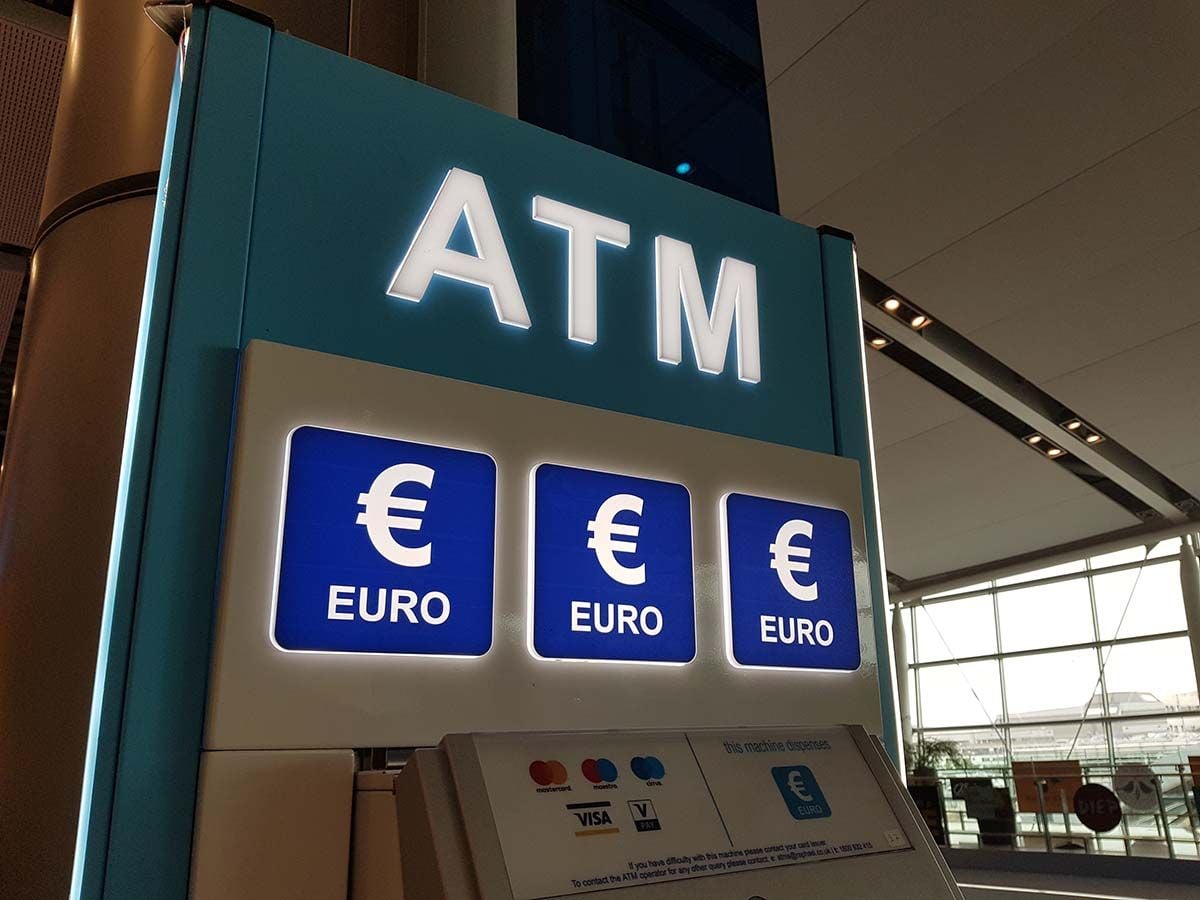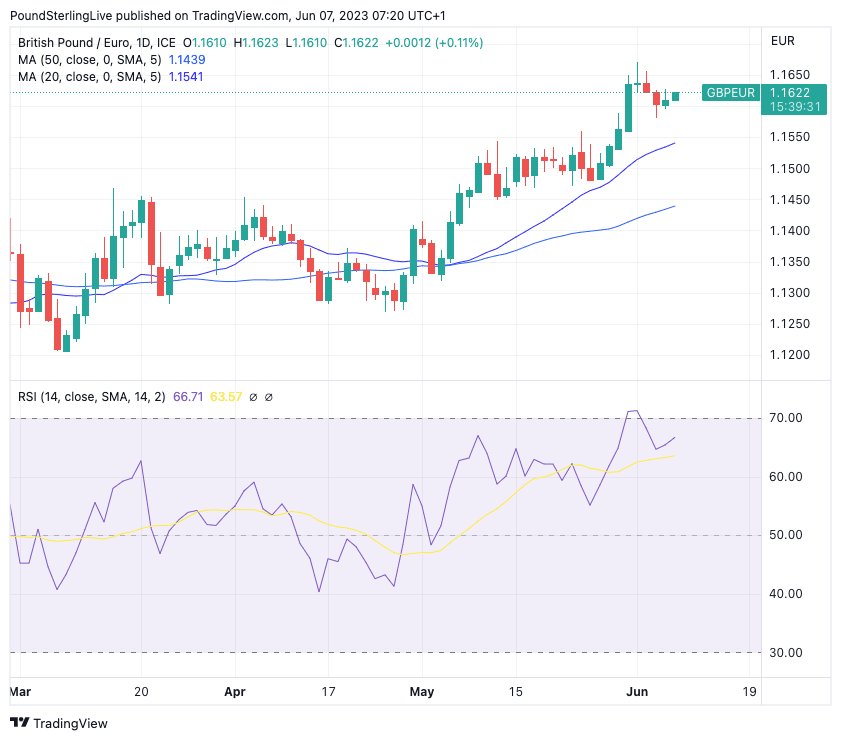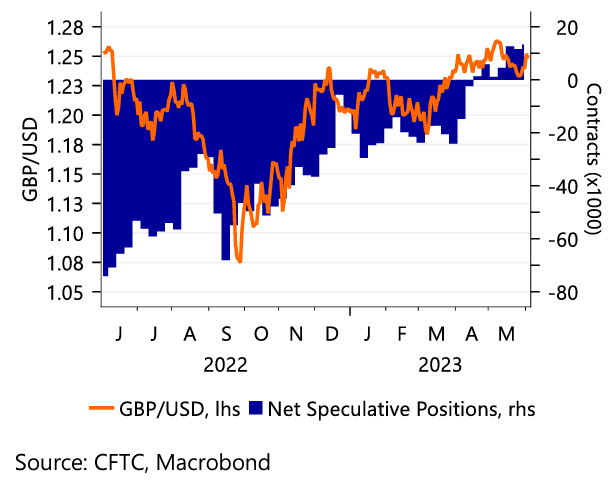GBP/EUR Exchange Rate Holds 1.16, GBPEUR Uptrend Still Intact Shows RSI, MA's
- Written by: Gary Howes

Image © Pound Sterling Live
The Pound to Euro exchange rate (GBPEUR) remains in an uptrend despite the setback seen at the start of the week and technical indicators advocate for further advances.
As foreign exchange trade moves through the midweek session GBPEUR is seen at 1.1623 as it extends a slight gain registered Tuesday.
The moves appear to amount to a period of consolidation for this pair following a strong 1.0% gain recorded in the prior week, something we suggested left Sterling ripe for a period of consolidation.
Indeed, the below chart reveals GBPEUR had entered 'overbought' territory as per the Relative Strength Index (RSI) which breached the 70 level last week:
Above: GBPEUR at daily intervals with RSI in lower panel.
An RSI above 70 suggests that an asset has reached overbought conditions and a pullback might be expected. Subsequent price action suggests this has been the case, as per the chart.
But the RSI also tells us momentum remains positive and further upside is preferred. The exchange rate meanwhile resides comfortably above its 20- and 50-day moving averages.
We would consider a more severe setback in the Pound were the GBPEUR exchange rate to slide below the 20-day moving average, and then the 50-day.
Compare Currency Exchange Rates
Find out how much you could save on your international transfer
Estimated saving compared to high street banks:
£2,500.00
Free • No obligation • Takes 2 minutes
Suggestions the Pound's uptrend might be coming to an end have meanwhile signalled by foreign exchange strategists at JP Morgan who are sellers of the Pound, saying it is only a matter of time before a more protracted pullback plays out in response to deteriorating economic growth fundamentals.
"The lack of GBP appreciation on the back of the shockingly high inflation print in the UK signalled that the sterling reaction function may be shifting given the growth implications," says Patrick R Locke, strategist at JP Morgan.
Locke also notes UK housing metrics are continuing to deteriorate, which comes against a backdrop of very high and sticky inflation.
"After some improvement in the first few months of the year, mortgage approvals fell below expectations again, signalling that financial conditions are beginning to bite the consumer," he says.
JP Morgan's analysts say any further tightening from the Bank of England only puts more pressure on the housing market and thus the consumer, especially as fixed-rate mortgages reset later this year.
"Repeated growth downgrades should thus reverse sterling’s gains this year which were driven to a large extent by growth improvements," says Locke.
Above: There has been a material improvement in sentiment towards Sterling since the lows of the Truss-era selloff.
Other analysts meanwhile maintain a positive stance on the Pound owing to expectations for further interest rate hikes at the Bank of England.
"Sterling continues to perform well. Markets have scaled back some of the aggressive (110bp) tightening priced in for this year, but not by much," says Chris Turner, head of FX research at ING Bank.
Money markets show investors are pricing close to 100bp of tightening this year and these expectations are elevated relative to those of the European Central Bank, allowing GBPEUR above 1.1630.
"Sterling now looks like a decent intra-European target currency for the carry trade," says Turner.
ING says it expects EURGBP to "drift to the 0.8550 area," a level that equates with a GBPEUR target of 1.17.
Strategists at Goldman Sachs are bullish on Sterling as they anticipate the Bank of England to maintain a supportive policy stance, saying that although it remains "a reluctant hiker", the sharp upside in inflation and the "only gradual rebalancing in labour demand" seems likely to push them towards further policy tightening.
Goldman Sachs economists recently raised their terminal Bank Rate forecast to 5.25% in September (vs. 5% in August), implying another three 25bp hikes ahead.
Economists also note that the Bank of England faces a less challenging trade-off now that energy prices have decreased sharply. This means that although higher interest rates will slow the economy, the scale of the setback will be far less severe given the decline in wholesale gas prices.
"This has naturally transitioned Sterling from a negative outlier to a positive one—in addition to other headwinds from last year that have now turned to tailwinds—and we think that can persist for a while longer as UK policymakers have relatively more work to do under our economists’ forecasts," says a weekly note from Goldman Sachs' currency strategy team.
Compare Currency Exchange Rates
Find out how much you could save on your international transfer
Estimated saving compared to high street banks:
£2,500.00
Free • No obligation • Takes 2 minutes






